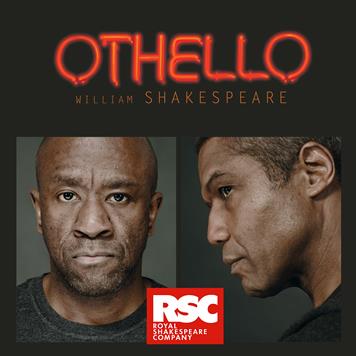Another in the series of RSC productions for the BBC’s “Culture In Quarantine” strand, Othello is, in many respects, the most difficult yet exciting of the six plays on offer. Iqbal Khan’s 2015 interpretation shakes things up by ditching two key ideas that have informed so many of the productions of the past and in so doing provides us with a version that sits more appropriately in the modern day repertoire than many another in recent memory. Firstly, the whole idea of the play being entirely based on race prejudice is undermined by casting both Othello and Iago as black. Secondly. the notion of “the noble Moor” is completely stripped away as we see Othello indulge in and condone behaviour which is definitely less than honourable.

Although most of the play takes place in the slightly exotic atmosphere of Cyprus (not quite Europe, not quite the Middle East) the action starts in Venice and Khan’s production delightfully has the first scene set on one of the canals with Iago and Roderigo in a small boat. As Iago listens to the racial insults about Othello we see that he too is affected by what is being said and that the two men have suffered the same experiences and have a common bond. Race is simply not the issue between them. Iago’s hatred springs from thwarted personal ambition as he feels he has been passed over in favour of Cassio, both white skinned and younger. Also, it gradually emerges that Iago despises Othello for his very lack of supposed and reported nobility; the general is not above using torture as a show of strength. In one of the most grippingly reimagined scenes of the play Othello straps Iago to a chair, threatens him with and even deploys tools upon him and partially suffocates his victim inside a plastic bag. It is a devastating reinvention and provides Iago with clear motivation for his desire for revenge.

Hugh Quarshie and Lucian Msamati as Othello and Iago bring out the hidden depths of the characters and force us to reappraise them. Both clearly have psychological issues. Quarshie’s Othello starts with a veneer of respectability and for a while it looks as if his interpretation is going to be pretty much standard. But the production is wrong footing us. Quarshie’s reading masks a hidden streak of cruelty which ultimately descends into psychotic rages. Meanwhile, Msamati’s Iago is shown as prey to OCD tendencies and becomes progressively more unhinged as the play progresses. By the end insanity seems to have taken over entirely as he laughs to himself as the lights fade. The mental insecurities on display also give much more credence to the jealousy that pervades the play. These are two chilling portraits of minds in turmoil which makes complete sense of the text, even if it wasn’t Shakespeare’s original intention.

There are also strong performances from the two female leads. Joanna Vanderham’s Desdemona makes a striking figure of a young woman trying to find her place in a society she knows little about. Emilia, her handmaid, is beautifully played by Ayesha Dharker showing a complete dedication to her mistress and a rising horror at the events which unfold in the last scene where she is on particularly strong form. The relationship between the two is based on mutual support (unlike that of the men). The devotion of Emilia and the vulnerability of Desdemona are revealed in the touching moments where they prepare the latter for what will be her death bed. It is a moment of complete contrast with the loud machismo on display in many other parts of the tragedy and the two women play it superbly. The macho posturing reaches its heights in a ridiculous and embarrassing rap battle entered into by Jacob Fortune-Lloyd as Cassio in a misguided and drunken white man’s attempt to curry favour with his mixed-race troops. This is prejudice as cultural appropriation and makes even more sense of Iago’s antipathy towards him. Othello, his wife, the general’s supposed new best friend – all become the subject of Iago’s hatred.

At three hours long, this production of Othello can seem a trifle ponderous especially in the early scenes but picks up pace at the end of the first half after which it fairly races forward to its inevitable grim conclusion. I think anyone coming to the play for the first time might well be advised to seek out another version first and then watch this production if only to see how clever it has been in departing from the ordinarily received view. This is an Othello for the here and now and one of the best versions I have seen.
Production photos by Keith Pattison
Othello is available via the BBC iPlayer for one month. Click here
It is part of the BBC’s Culture In Quarantine strand which features five other recent RSC productions. Click here
To keep up with the blog and all the latest online theatre reviews please click here and choose a follow option
For my Theatre Online list (suggestions and news of newly released productions) please click here. This list is supplemented by daily updates on Twitter (@johnchapman398)


5 thoughts on “Othello (Online review)”